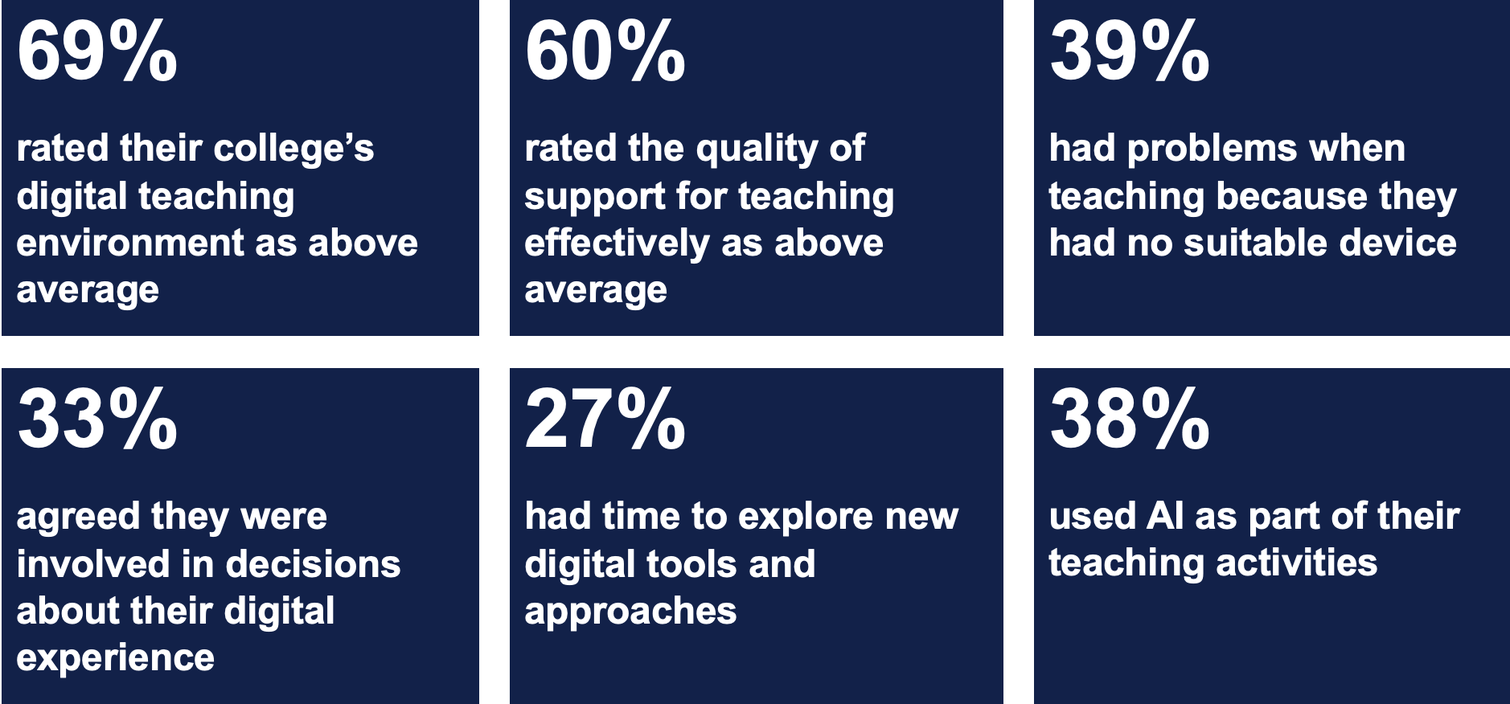2023/24 UK further education teaching staff digital experience insights survey findings
The digital experience insights survey for further education teaching staff took place between October 2023 and June 2024. Participating FE colleges and sixth form colleges were able to select their own survey period within these dates, typically a three to four week window.
There were 860 respondents from 19 organisations. 13 of these were based in England, four in Wales, and two in Scotland. These 19 organisations represent 7% of all further education providers in the UK.
The highest number of responses from a single organisation was 135 teaching staff and the mean number of responses was 45 per organisation (on average 14% of the total number of teaching staff in each organisation that participated). However, four of the 19 organisations contributed fewer than 20 responses.
A survey indicating the digital experience of higher education teaching staff was run simultaneously and results can be found on our 2023/24 higher education teaching staff report page.
Through Jisc’s digital experience insights service, organisations can gain valuable data to inform strategic, operational and digital investment decisions, evidence year-on-year improvements and demonstrate return on investment. Organisations that take part have access to their own data to assess their unique situations as well as benchmarking data. Full information about the digital experience insights surveys is detailed on our information page.
Executive summary

Our 2023/24 digital experience insights survey for further education teaching staff asked questions that explored the overall experience of teaching using digital technologies. Core questions, asked each year, allowed us to gain insights into the environment for teaching using digital technologies and about the support offered to help teaching staff make effective use of digital tools in their teaching. We also asked about the kinds of devices and activities employed in teaching. Teaching staff from 19 organisations shared their experiences.
This year’s survey results show that further education organisations have made some improvements in developing their digital teaching environments. 69% of survey respondents thought the quality of the digital teaching environment was best imaginable, excellent or good in their organisation, compared to 66% in last year’s survey. About three-fifths (60%) of teaching staff rated the quality of support for teaching effectively using technology as above average, compared to 56% in last year’s survey. Within these areas, further positive themes emerged. However, participants also pointed towards areas where improvements could be made.
Teaching staff were provided with, and employed, a wide range of platforms and tools as part of their teaching practice. Most (60%) felt that digital technologies enabled them to teach in the ways they preferred. The majority used tools such as online quiz platforms (74%) and platforms to upload or produce online content (74%). However, there may have been a lack of organisational support for the effective use of digital technologies in some areas. Only around a quarter (27%) felt that they had the time to explore the most appropriate way of using technologies, and only about two-fifths (41%) said they had guidance offered to them about the digital skills needed in their teaching role.
When we asked teaching staff to provide suggestions for how their organisation could better support effective digital teaching, many suggested the provision of a wider range of basic, intermediate and advanced level training, offered throughout the academic year. They also wanted more guidance and best practice examples for embedding the use of digital technologies in their teaching practice. Many teaching staff also noted that not all learners had the requisite basic digital skills to fully engage with digital learning experiences, so support also needed to be directed towards learners.
Taught classes took place primarily on campus (88%), with very few (2%) teaching staff primarily teaching their courses online, or through a mix of on campus and online delivery (10%). These percentages are about the same as in last year’s survey. This broadly matched staff preferences for teaching. Despite this, survey respondents recognised the positive benefits of teaching using digital technologies (on campus or off campus), including the great flexibility offered to them, as well as learners, particularly where personal circumstances prevented on campus attendance, and the possibilities for enhancing engagement with course content. However, numerous teaching staff experienced problems with their devices and had connectivity issues. This included laptops with poor battery life and low specifications that could not cope with course demands. Wifi and connectivity issues were faced by many: 60% had issues with wifi and 39% could not access they systems they needed. These issues may have hindered or disrupted classes and other teaching activities.
We asked about artificial intelligence (AI) directly for the first time in this year’s survey. About a third (32%) of respondents said they were provided with some form of AI tool to support their teaching, whereas just under two-fifths (38%) used AI during the academic year as part of their teaching role. About the same (38%) received guidance in the appropriate use of artificial intelligence tools.
We hope that further education organisations respond to some of the issues that teaching staff consider to be problematic, and explore the ways they could improve the overall support provided to teaching staff. We also investigated the experiences of learners in our 2023/24 digital experience insights survey for further education learners.
Full report
Download our 2023/24 UK further education (FE) teaching staff digital experience insights survey findings [pdf].